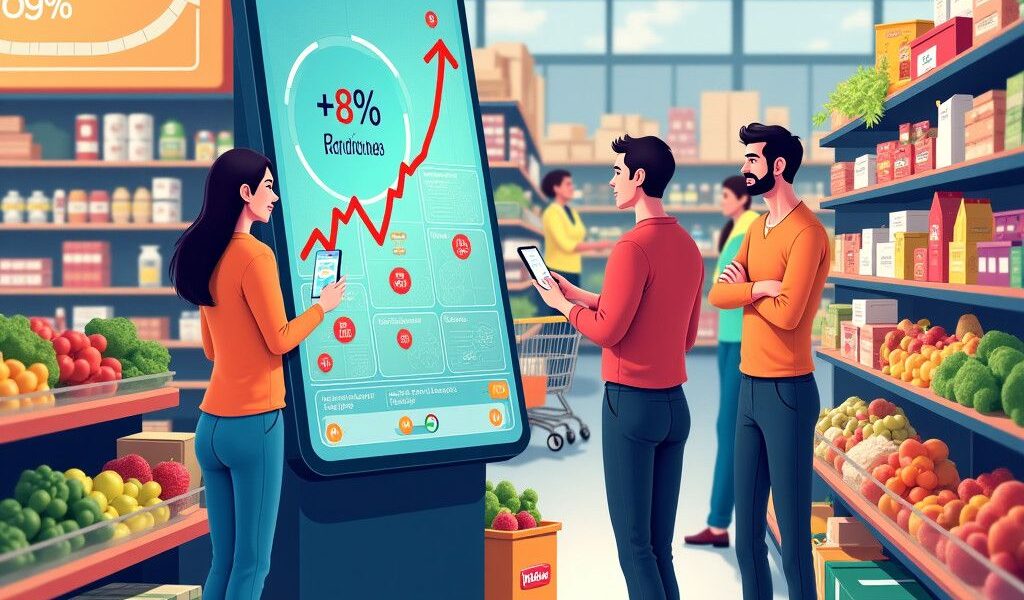The introduction of artificial intelligence (AI) in retail strategies has significantly reshaped the grocery sector, contributing to an impressive 8% growth in online revenue, according to recent findings from SymphonyAI’s third annual omnichannel shopper analysis. This data not only highlights the potential of AI to enhance consumer behavior but also emphasizes its ability to transform single-channel shoppers into higher-spending omnichannel customers.
The research was conducted over a six-month period in 2024, offering a clear picture of evolving shopper dynamics. A notable revelation from the analysis is that 81% of new online shoppers are first-time purchasers with the grocery retailer. This underscores a vital opportunity for grocery brands to cultivate loyalty from customers who are exploring online shopping for the first time.
Moreover, the average basket size for online shoppers is three times larger than that of in-store shoppers. This statistic illustrates the potential benefits grocery retailers can realize by investing in robust online platforms that can accommodate larger transactions. The increased basket size can be attributed to the ease of online shopping, where consumers can browse, compare prices, and select multiple items without the physical constraints of a retail space.
One particularly promising aspect of SymphonyAI’s data is the observed trend where fourth-quarter in-store shoppers demonstrate a greater inclination to transition to online shopping compared to other times of the year. Retailers can capitalize on this seasonal shift by implementing targeted marketing strategies during the holiday period to retain these newly converted customers beyond the festive season. Research indicates that maintaining customer engagement post-holidays can lead to a revenue increase of over 3% in e-commerce sales.
Additionally, the analysis highlights an interesting shift in consumer preferences towards smaller basket transactions. Groceries in categories like alcoholic beverages and baby products are witnessing a significant uptick in sales, indicating changing consumer behaviors driven by convenience-seeking online shoppers. Retailers who adapt their product assortments to reflect these trends could see substantial increases in their sales volumes.
The unique advantages of utilizing AI insights are clearly articulated by Sonia Parekh, General Manager of Customer-Centric Retailing at SymphonyAI. She notes, “With a worldwide customer portfolio of hundreds of leading retailers using SymphonyAI connected retail products, we see first-hand the measurable impact of AI-based insights and actions to engage shoppers optimally across channels.” This statement reinforces the notion that AI is not merely a trend but a transformative tool that can redefine the retail landscape.
To fully leverage the potential of AI in grocery retail, retailers must adopt tailored assortment strategies. This involves analyzing shopper preference data and using it to inform product selection and placements online. For example, if data indicates that a significant portion of online shoppers prefer larger pack sizes for specific categories, retailers can optimize their offerings to showcase these options prominently. This method not only enhances customer satisfaction but also encourages larger purchases.
Additionally, as retailers look to refine their marketing strategies, investing in personalization through AI tools can yield significant benefits. Personalized marketing messages that reflect the interests and shopping habits of consumers can drive engagement and repeat purchases. For instance, sending tailored product recommendations based on previous purchases or browsing history can help maintain consumer interest and encourage increased spending.
The use of AI in retail is not just about boosting revenue; it is also about building strong relationships with customers. Consumers are increasingly valuing brands that understand their needs, preferences, and shopping behaviors. By utilizing AI technologies to gather and analyze data, retailers can create more personalized experiences that resonate with their target audience.
In conclusion, SymphonyAI’s findings demonstrate that the integration of AI in grocery retail strategies presents an opportunity for enhanced revenue growth and customer loyalty. As the retail landscape continues to evolve, adopting AI-driven technologies will be crucial for grocery brands looking to thrive in an increasingly competitive market. The data unequivocally supports the premise that AI is not merely a peripheral tool but a core component of successful retail strategies moving forward.












